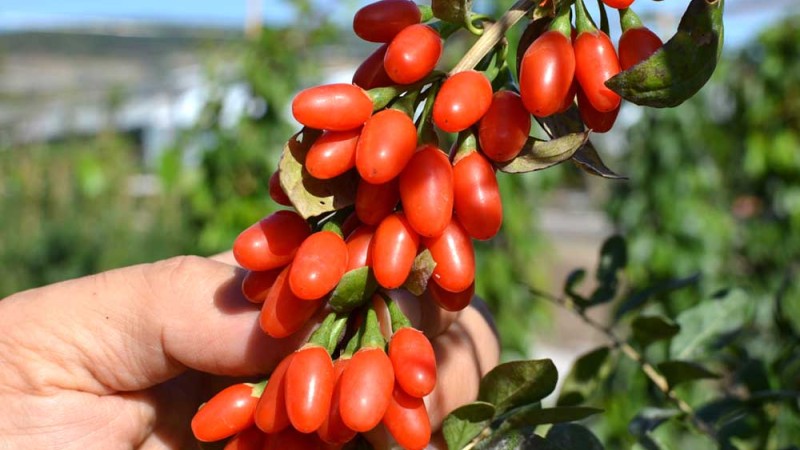
In China and Tibet, Goji fruits are called "happy fruits". The people there are firmly convinced that those who eat Goji berries will achieve the highest level of satisfaction. In honor of the Goji, various festivities are held in these countries as a thank you for their health-promoting qualities - energy, strength and endurance, but also longevity and beauty. Goji is a small red berry with very remarkable effectiveness. It tastes like a mixture of cherries and cranberries and is an important part of Chinese cuisine and natural medicine.
According to ancient Asian traditions and the beliefs of contemporary scientists, regular consumption of Goji will ensure a vital and happy life. But what does science say? Who can bring the best evidence of the sensational effects of Goji today, if not modern science? It was found that the most nutritious plant on Earth is the Chinese gooseberry - Goji, more precisely its fruits. It has also been shown that in regions where Goji grows and is regularly consumed, the number of 100-year-olds is 16 times higher than in other regions.
When examining Goji berries, the Goji berry was found to contain a high proportion of essential amino acids, proteins and trace elements. It also contains a large amount of vitamins and effective nutrients. If this undemanding plant gets enough sun, it grows also in simple conditions. However, it does not tolerate salted soil or soil containing heavy metals. Therefore, Goji is most widespread in nature in wild areas and far from the coast. After harvesting, the fruit is dried in the sun to prevent the loss of nutrients. The fruits dried in this way are consumed either raw or cooked. Their taste is sweet, reminiscent of cranberries, added to muesli, to vegetables, or eaten separately as a snack. They are a strong and healthy addition to conventional food.
Composition of Goji berries
As early as 1980, scientists in Ningxia, China, discovered something that was later confirmed in Western countries. The Goji berry is a small, capsule-sized vitamin bomb created by nature that not only tastes like fruit, but really is. But this little gem is not only packed with vitamins and minerals. It also contains dozens of valuable phytonutrients and a whole range of essential amino acids - something that only exists in the rarest forms of fruit. The polysaccharides of Lycium barbarum (named after the Latin name of the plant) include all the health-promoting substances. The small seeds of the fruit also contain a valuable dose of important essential fatty acids, carbohydrates and fiber.
We can say that the nutritional system of this small berry is almost perfect:
proteins 15.6%, sugars 42.0%, of which polysaccharides 32.0%, fats 0.45%, fiber 21.0%
Essential fatty acids in seeds:
• 100 g Goji oil contains:
• linoleic acid: 3.4 g
• oleic acid: 16.8 g
• palmitoleic acid: 7.3 g
• stearic acid: 3.2 g
• 19 amino acids, including all essential amino acids
• vitamin C
• B vitamins: B1, B2, B3
• minerals: calcium, magnesium, potassium, phosphorus
Trace elements:
iron, copper, zinc, manganese, chromium, selenium, aluminum, arsenic, barium, beryllium, lead, boron, cadmium, germanium, cobalt, lanthanum, lithium, molybdenum, nickel, niobium, mercury, silver, strontium, titanium, vanadium, yttrium, tin, zirconium and some others...
Carotenoids: alpha-carotene, beta-carotene, zeaxanthin and lutein
Polyphenols: ellagic acids and others
Additional bioactive compounds: acyclic peptides
Healing effects of Goji
For thousands of years, Goji berries have been used in traditional Chinese medicine. Traditionally, the Chinese consume dried Goji berries for high blood pressure and high sugar, for eye problems, to support the immune system, and for the prevention and treatment of cancer. As a single daily dose, 6-15 grams of dried berries are sufficient. They are consumed separately, or as a decoction, wine, or alcohol extract. Scientific tests and laboratory studies of the active substances contained in Goji have revealed the first data on their health effects:
• Goji extracts protect against optic nerve damage in diagnosed glaucoma
• Goji polysaccharides have immunomodulatory effects - they strengthen immunity
• Goji water extracts have strong antioxidant properties
Unsurpassed antioxidant content
Unique to Goji is the group of lycium polysaccharides. These are exceptionally strong antioxidants, i.e. substances that neutralize free radicals. In this way, they help prevent cell damage and aging of the body. Free radicals are created, for example, as a by-product of respiration and are today considered the main cause of aging and degeneration of the body. Goji is a fruit with unsurpassed nutritional potential. The centuries-old secret for health and beauty is rediscovered. The content of vitamin C in Goji berries is three times higher than in an orange, it contains more B vitamins than any other fruit, and its minerals and trace elements break all records. The unprecedented wealth of substances supporting health and vitality contained in the berries makes Goji a "Superstar" among medicinal plants. Movie stars from the USA use Goji extracts as a secret tip for physical well-being and beautiful, wrinkle-free skin. Goji berries are also becoming increasingly popular in Europe. Goji berries are called "fruits of happiness" in their homeland - China and Tibet, because people are firmly convinced that consuming this fruit will bring them the greatest state of satisfaction.









